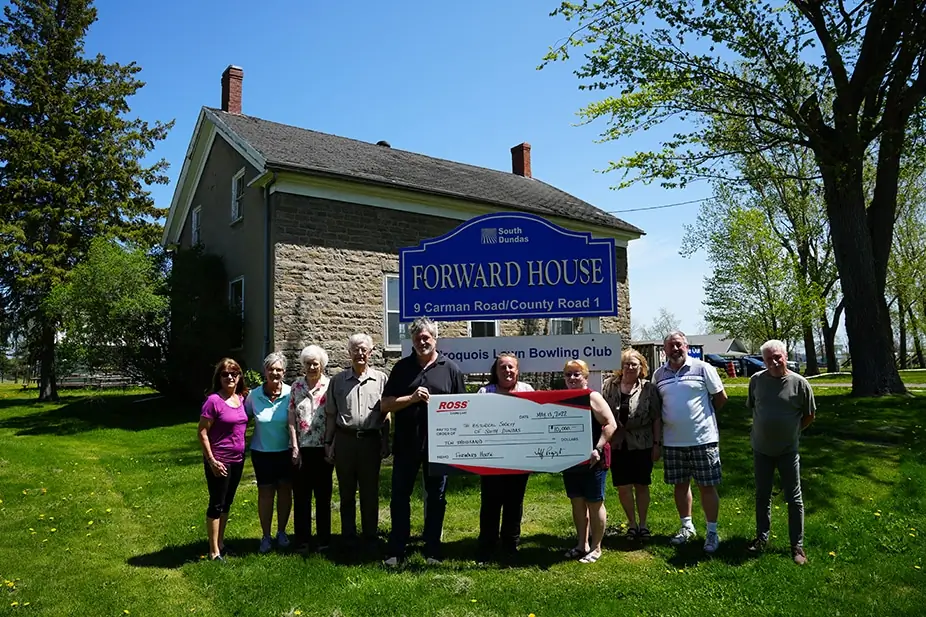
Somewhere near Iroquois, Ontario during the war of 1812, Michael Carman and his son were paid two chests of silver by the British Royal Navy to harvest timber for a fort that was never built.
More than 200 years later in the same vicinity, Kanata North tech company Ross Video broke ground on a $15 million factory expansion that will step up production of their live broadcasting video components.
While the Carman’s structure was never completed and the 55,000 square foot factory expansion is well underway, the two projects have more in common than you think. They’re both integral to the small community’s culture and history.
The Carmans used the silver and timbers to build Carman House, one of three historic stone buildings in Iroquois (population 1200). Murray Richer, curator of the Carman House Museum, surmises that Michael Carman the second may have used a few of those timbers to build another historic stone building — Forward House — between 1815 and 1820.
Despite being one of the few pieces of history left after the St. Lawrence Seaway was built in the 1950s, Forward House was slated for demolition in 2016.
That’s where Ross Video comes in.

Due to the company’s commitment to the community, the life and times of Forward House is now linked across two centuries by two intrepid engineers. Canal planner A.E. Forward (who fortuitously married into the Carman family) claimed Forward House as his own. Computer engineer David Ross just helped save it from destruction.
After Forward House was slated for demolition, the local historical society stepped up with a petition and a plan to save it. Ross answered the call for donations from Steven Campbell of the Historical Society of South Dundas (HSSD) with a contribution of $10,000. (Which amounts to about 27 pounds of silver, but I’m not sure how many chests you’d need for that).
Because the community came together to fund the restoration, Forward House was saved and will one day be a tearoom and gift shop, combined with the Tourist Information Centre and home for the Historical Society of South Dundas. The second floor will house an extensive collection of historical artifacts.
Ross Video’s strong ties with Iroquois
So why does Ross Video care about a crumbling old building in a small Ontario town most people have never heard of? It’s not just because the company manufactures its components there. Ross considers Iroquois his childhood home, which is why he also donated $30,000 of IT equipment when the local highschool was slated to be closed.
“Forward house is just part of the fabric of the community,” said Jeff Poapst, chief manufacturing and services officer for Ross Video. “It’s well known and seeing it restored, there are a lot of volunteers that have signed on and contributed.”
Poapst, who’s been with the company for 15 years, explained why their philanthropy is focused on Iroquois. “Whatever we contribute in Ottawa goes into a big pool. But we can do a lot in a small town like Iroquois,” he said. “It’s a relationship between a company and the citizens who benefit from our company being here.”
At one time, Ross Video was a well-kept secret in Iroquois, but they soon realized that needed to change to recruit talent. “People didn’t know what we did,” said Poapst. “We can’t be a well-kept secret if we want to keep growing.”
The goal is to keep growing and giving back
While protecting and restoring a heritage building is one way Ross Video is contributing to the community’s future, more buildings are needed for it to thrive.
According to Poapst, Iroquois needs new affordable housing for families. About 40 per cent of the factory’s employees live in Iroquois, but many more have to commute from as far away as Cornwall due to the shortage of housing.
Poapst knows there’s potential to grow both Iroquois and Ross Video’s role in it. “We’ve got a luxury here that our water and sewer systems have a lot of untapped capacity,” he said. “Building here has fewer barriers than it does in other local communities.”
The only thing we can’t guarantee potential builders is how many chests they’ll need to bring if they want to get paid in silver.
